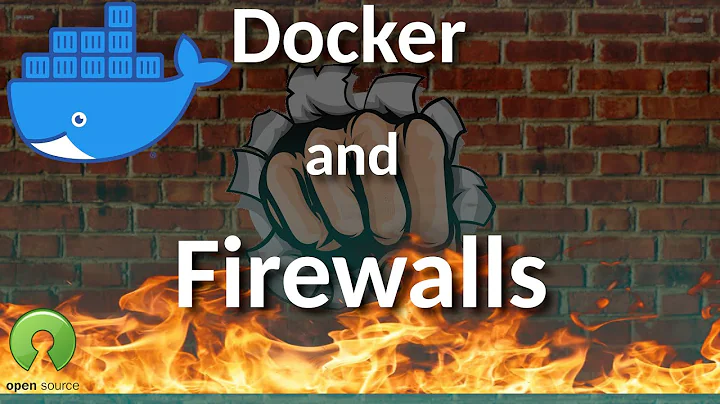Uncomplicated Firewall (UFW) is not blocking anything when using Docker
Solution 1
The problem was using the -p flag on containers.
It turns out that Docker makes changes directly on your iptables, which are not shown with ufw status.
Possible solutions are:
Stop using the
-pflag. Use docker linking or docker networks instead.-
Bind containers locally so they are not exposed outside your machine:
docker run -p 127.0.0.1:8080:8080 ... -
If you insist on using the
-pflag, tell docker not to touch youriptablesby disabling them in/etc/docker/daemon.jsonand restarting:{ "iptables" : false }
I recommend option 1 or 2. Beware that option 3 has side-effects, like containers becoming unable to connect to the internet.
Solution 2
16.04 presents new challenges. I did all the steps as shown Running Docker behind the ufw firewall BUT I could NOT get docker plus UFW to work on 16.04. In other words no matter what I did all docker ports became globally exposed to the internet. Until I found this: How to set Docker 1.12+ to NOT interfere with IPTABLES/FirewallD
I had to create the file /etc/docker/daemon.json and put the following in:
{
"iptables": false
}
I then issued sudo service docker stop then sudo service docker start FINALLY docker is simply following the appropriate rules in UFW.
Additional data: Docker overrules UFW!
Solution 3
If you're using the init system of systemd (Ubuntu 15.10 and later) edit the /etc/docker/daemon.json (might need to create it if it does not exist), make sure it has iptables key configured:
{ "iptables" : false }
EDIT: this might cause you to lose connection to the internet from inside containers
If you have UFW enabled, verify that you can access the internet from inside containers. if not - you must define DEFAULT_FORWARD_POLICY as ACCEPT on /etc/default/ufw and apply the trick described here: https://stackoverflow.com/a/17498195/507564
Solution 4
In my case I've ended up modifying iptables to allow access to Docker only from specific IPs.
As per ESala's answer:
If you use
-pflag on containers Docker makes changes directly to iptables, ignoring the ufw.
Example of records added to iptables by Docker
Routing to 'DOCKER' chain:
-A PREROUTING -m addrtype --dst-type LOCAL -j DOCKER
-A OUTPUT ! -d 127.0.0.0/8 -m addrtype --dst-type LOCAL -j DOCKER
Forwarding packets from 'DOCKER' chain to container:
-A DOCKER -i docker0 -j RETURN
-A DOCKER ! -i docker0 -p tcp -m tcp --dport 6379 -j DNAT --to-destination 172.17.0.3:6379
You can modify iptables to allow access to DOCKER chain only from specified source IP (e.g. 1.1.1.1):
-A PREROUTING -s 1.1.1.1 -m addrtype --dst-type LOCAL -j DOCKER
-A OUTPUT -s 1.1.1.1 ! -d 127.0.0.0/8 -m addrtype --dst-type LOCAL -j DOCKER
You may want to use iptables-save > /tmp/iptables.conf and iptables-restore < /tmp/iptables.conf to dump, edit, and restore iptables rules.
Solution 5
A fast workaround is when running Docker and doing the port mapping. You can always do
docker run ...-p 127.0.0.1:<ext pot>:<internal port> ...
to prevent your Docker from being accessed from outside.
Related videos on Youtube
ESala
Experienced Software Engineer with a demonstrated history of working in the research industry. Strong technical professional with a Master's Degree focused in Industrial Electronics and Automatics from the Technical University of Catalonia (UPC). Currently completing a PhD in Data Science applied to the improvement of the Energy Efficiency of HVAC in Smart Buildings. Skilled in Backend Applications with Java, Kotlin and Spring Framework, and Data Science with Matlab and Python. Interested in Microservices, Reactive Programming, the Internet of Things, Android Development and Electronics.
Updated on September 18, 2022Comments
-
ESala over 1 year
This is my first time setting up an Ubuntu Server (14.04 LTS) and I am having trouble configuring the firewall (UFW).
I only need
sshandhttp, so I am doing this:sudo ufw disable sudo ufw reset sudo ufw default deny incoming sudo ufw default allow outgoing sudo ufw allow 22/tcp sudo ufw allow 80/tcp sudo ufw enable sudo rebootBut I can still connect to databases on other ports of this machine. Any idea about what am I doing wrong?
EDIT: these databases are on Docker containers. Could this be related? is it overriding my ufw config?
EDIT2: output of
sudo ufw status verboseStatus: active Logging: on (low) Default: deny (incoming), allow (outgoing), deny (routed) New profiles: skip To Action From -- ------ ---- 22/tcp ALLOW IN Anywhere 80/tcp ALLOW IN Anywhere 22/tcp (v6) ALLOW IN Anywhere (v6) 80/tcp (v6) ALLOW IN Anywhere (v6)-
solsTiCe almost 9 yearswhat database ? which port ? Are you sure this is the same machine ? what is the output of
ufw status -
ESala almost 9 years@solsTiCe yes, I am sure it is the same machine. The database is InfluxDB (on a docker container) with ports
8083and8086. I added theufw status verboseoutput in the question. Thanks.
-
-
Andreas Reiff about 8 yearsThis is so useful - I was going crazy with being able to access ports I had not allowed in ufw. Using iptables=false breaks a lot though, like containers becoming accessible on localhost, e. g. for reverse proxying. Better to make sure that container listen correct, don't use -p 80:80 but use -p 127.0.0.1:80:80 or different port like 127.0.0.1:3000:80 for reverse proxying with nginx or apache and no port clashes.
-
ESala about 8 years@AndreasReiff you are right, but lately I have found it best to avoid
-pas much as possible. For example, in the case of a reverse proxy I don't map any port for the worker containers, and then put nginx in it's own container with-p 80:80and a--linkto the others. This way there cannot be any port clashes and the only point of access is through nginx. -
Henk about 8 yearsAlso check this post for a third precaution you have to take! svenv.nl/unixandlinux/dockerufw
-
 orshachar over 7 yearsImportant :
orshachar over 7 yearsImportant :/etc/default/dockeris a configuration file used by the upstart config. If you have moved from upstart to systemd, this file will not be used. -
 ctbrown over 6 years@ESala You should think about un-marking this answer as correct since it is dated.
ctbrown over 6 years@ESala You should think about un-marking this answer as correct since it is dated. -
 ctbrown over 6 yearsWith Ubuntu 16.04 and Docker version 17.09, this solution breaks outbound connection from the containers. See response askubuntu.com/a/833363/262702 and askubuntu.com/a/954041/262702
ctbrown over 6 yearsWith Ubuntu 16.04 and Docker version 17.09, this solution breaks outbound connection from the containers. See response askubuntu.com/a/833363/262702 and askubuntu.com/a/954041/262702 -
spencer.sm almost 5 yearsWhy does it work when using
127.0.0.1but not withlocalhostor0.0.0.0? -
 paleo13 almost 4 yearsThis solution worked for me - thank you!
paleo13 almost 4 yearsThis solution worked for me - thank you! -
 Duco about 3 yearsThank you so much! This answer still holds true as of 2021. It was driving me nuts I could access my database from anywhere, but with this answer I finally fixed the problem.
Duco about 3 yearsThank you so much! This answer still holds true as of 2021. It was driving me nuts I could access my database from anywhere, but with this answer I finally fixed the problem. -
Somebody about 3 yearswoah! that's some serious security breach...
-
Y.Terz over 2 yearsThis doesn't seem right, as according to the documentation, "an ephemeral host port is chosen for the host port". I think it's better to use expose instead.




